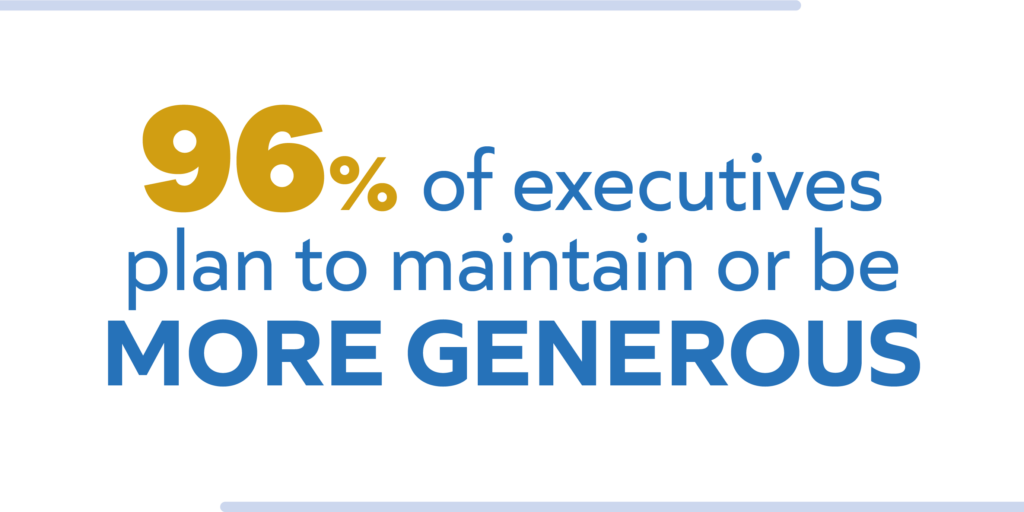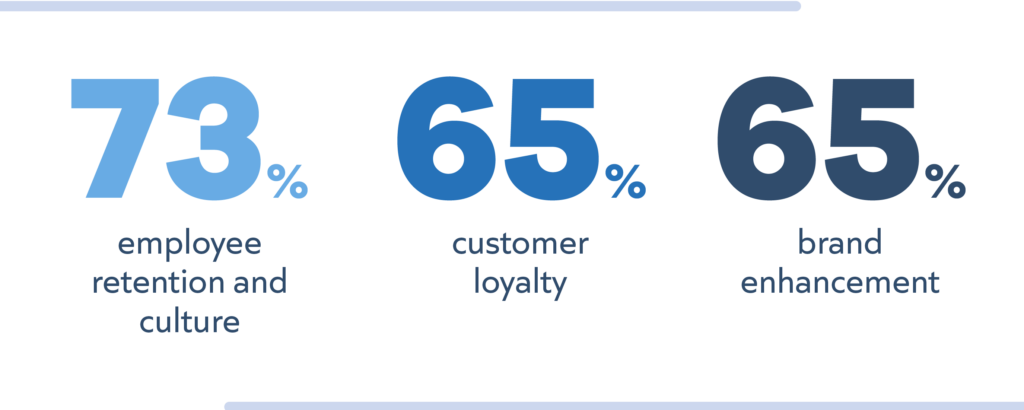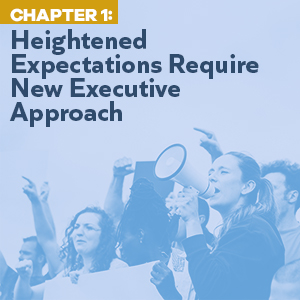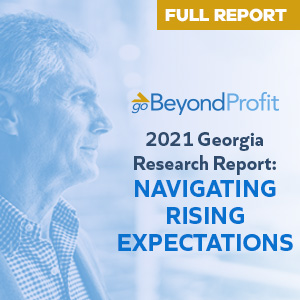Chapter 4
Investing Where It Matters
Most in 2021
Summary: Being seen as a generous company yields business value such as: enhanced company culture, retention and loyalty and businesses are aligning their investments accordingly. When cross-referenced with what stakeholders want to see, leaders can hone a more effective and differentiated path for their business in 2021. Spoiler alert: it’s mostly about how leaders show authentic care, first for their people, and for community. We call this emotional generosity and provide specific recommendations to consider.
Corporate generosity is smart strategy. It is no surprise that many business leaders (47%) say “right now” they’re more focused on business survival than generosity efforts. This is led by businesses with under 50 employees, of which 48% agree, while only 33% of companies with more than 500 employees agree. Yet even in this environment, this year’s survey confirms that rebuilding as an empathetic business with concern for others is a path for stronger, more durable recovery.

An astonishing 96% of executives plan to maintain or increase their generous activities, with nearly half (49%) of executives intending to do more generous activities and charitable efforts in the future. These numbers have held essentially steady for three years, showing continued commitment to the corporate generosity strategy, even through pandemic and economic upheaval.
Leaders are seeing the business value of demonstrating generosity and community outreach, with more than half (52%) agreeing it is critical to overall business health. This is backed by the overwhelming number of Georgians (83%) who increasingly feel it’s important for business to do.
Where in the P&L are generosity related expenses being reflected?
When it came to where expenses show up in the budget, an overwhelming majority of leaders cited charitable giving (70%), and a little more than half (52%) cited marketing and external communications. Employee volunteerism and creating a purpose driven culture were each named by 44% of respondents.
In a rough measure of internal and external effort, senior leaders agreed they’ve increased empathetic demonstrations with a clear majority (75%) cognizant of demonstrating more empathy and care internally, while more than half (66%) have also increased visible compassion externally.
For specific insight into the elevated topic of racial equity, the survey determined that 42% of respondents say they have initiatives to advance racial equity underway. Another third (32%) are beginning new initiatives or doing more in this area.

And where is the ROI showing up? Company Culture, Retention and Loyalty.
The majority of executive respondents (73%) find return on investment in the areas of employee retention and culture. In addition, leaders find value in customer loyalty (65%) and brand enhancement (65%).
Prioritizing for maximum impact in 2021
When budgeting executive time, company bandwidth and capital allocations, this year’s report indicates wise prioritization will include increasing embedded “Emotional Generosity” rather than more activities per se. Specific priorities should include:
- Use company values for decision making. Focus on defining and demonstrating core company values with consistency, using these values as guardrails for what to say and do … and when to stay silent. Align public statements (and lack thereof) with the highest needs of employees and the business.
- Use purpose to galvanize stakeholders. Claim and communicate the company’s larger purpose beyond profit to energize stakeholders.
- Elevate employee wellness. Prioritize focus and investment on employees’ mental and physical wellness.
- Show more empathy. Infuse empathy for stakeholders inside and outside the company into decision making and communications.
- Execute an equitable and inclusive workplace. Nurture a culture where employees feel heard and valued.
- Prioritize environmental practices. Consider the impact of your overall operational footprint, reduce or mitigate negative impacts, and demonstrate positive sustainability commitments.
- Maintain strong charitable giving. Continue to contribute resources and time to solve community needs, making sure to align charitable investments and volunteerism with company values.
In this year of recovery and new normal, empathy for employees and concern for community needs and social issues are more important than ever. Thankfully, prioritizing these does not require big expenditures of time or money. Authenticity and empathy are powerful and free resources.




